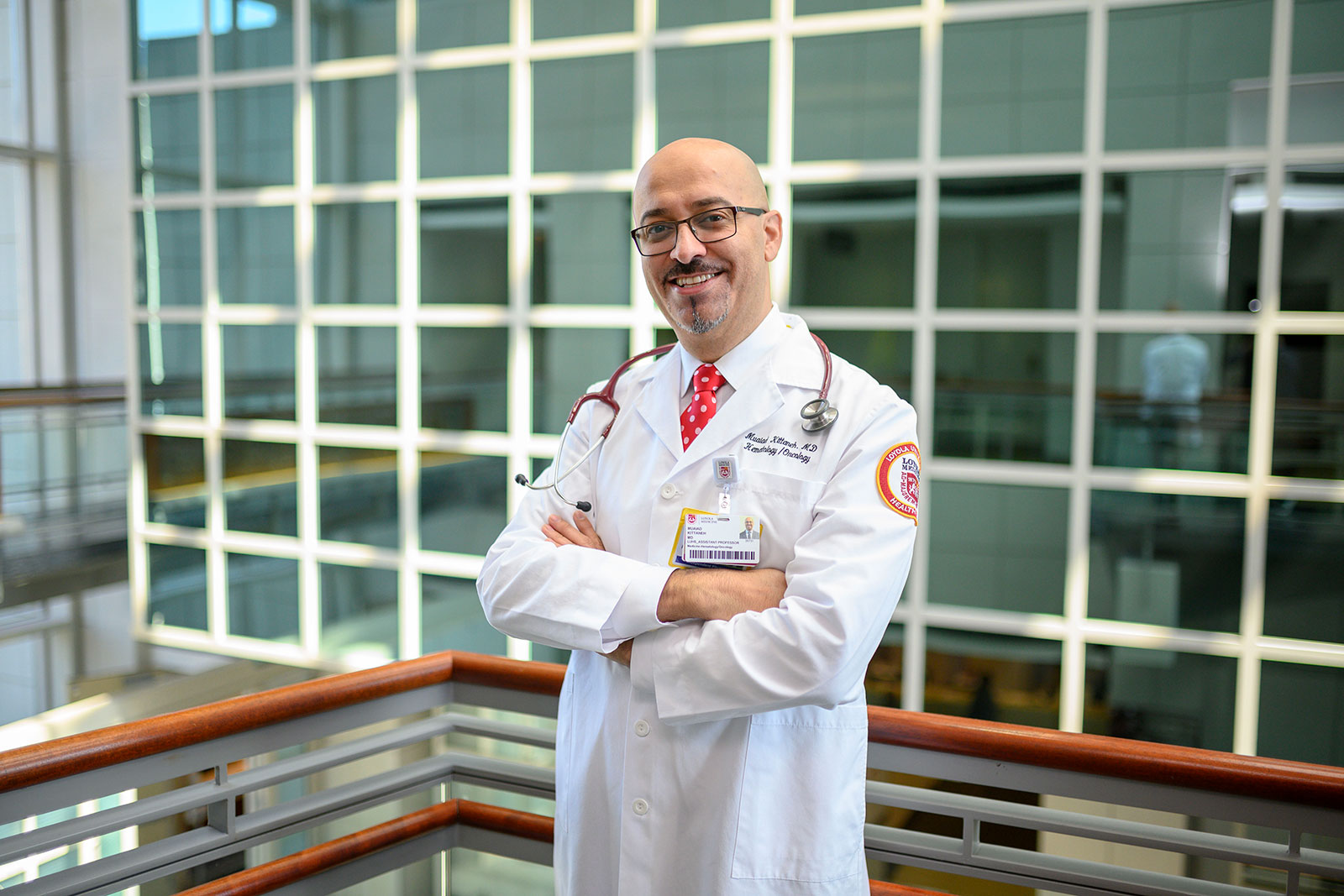About 15 miles from downtown Chicago, down lonely highways and across yellowed flatlands, sits Loyola Medical Center’s Cardinal Bernardin Cancer Center. A behemoth rising from an empty field, the suburbs tucked neatly behind to the east, the Cardinal Bernardin Cancer Center houses the part-time office of Dr. Muaiad Kittaneh, the only peritoneal mesothelioma specialist in the greater Midwest.
Mesothelioma is a cancer usually caused by exposure to asbestos. It’s incredibly deadly, aggressive, and rare—and therein lies the problem. Its rarity makes it difficult to advance cures. But for the 3,000 people diagnosed with mesothelioma every year, more needs to be done, and sooner rather than later.
According to the American Society of Clinical Oncology (ASCO), “The overall 5-year survival rate for people with mesothelioma is only 10% because it is usually diagnosed at a late stage.” There are very few treatments currently for mesothelioma, and there are not enough doctors with the necessary skills to find new, better treatments.
The rarity of the disease was what initially drew Kittaneh to this specialization. “For somebody to build a career in medicine on a rare disease, it’s a challenge,” he says. “I’m somebody who is driven by challenge.”
Before Kittaneh got his start developing the mesothelioma program at Loyola, he worked in the field of experimental therapy, determining dosages of newly discovered or invented drugs. “During the course of that work I [saw] multiple different tumor types, including mesothelioma,” says Kittaneh. This is when he first became familiar with something called BAP1 tumor predisposition syndrome. According to the NIH’s Genetics Home Reference (GHR), the BAP1 gene is thought to help control cell growth and cell death.
“Although the exact mechanism is unclear, the BAP1 protein acts as a tumor suppressor. Tumor suppressor proteins help prevent cells from growing and dividing too rapidly or in an uncontrolled way,” the GHR website states.
BAP1 tumor predisposition syndrome, however, is a genetic disease that increases the risk of cancers that occur in the skin, eyes, kidneys, and the tissue that lines the chest, abdomen, and the outer surface of internal organs— the mesothelium (hence the name for the cancer formed in this tissue: mesothelioma).
Mesothelioma patients deserve a specialist or someone who specifically treats the disease to advance the field
-Dr. Muaiad Kittaneh
According to GHR, people with BAP1 tumor predisposition syndrome contract more aggressive cancers, however, “individuals with malignant mesothelioma as part of the BAP1 tumor predisposition syndrome appear to survive longer than those who have the cancer without the syndrome,” the website states.
Kittaneh’s first encounter with a BAP1 patient is what triggered his interest in mesothelioma. “Although it’s a rare disease, [mesothelioma] is the most common cancer to have BAP1 mutations,” Kittaneh says. Which is good news for the future of mesothelioma research, according to Kittaneh. “[Because] the prevalence of BAP1 in mesothelioma is high, [it] may allow significant advances in the field,” he says.
The most common type of mesothelioma is pleural mesothelioma, which begins in the lining surrounding the lungs. Peritoneal mesothelioma, Kittaneh’s specialty, begins in the tissue surrounding the abdominal area and accounts for only 10 to 20 percent of mesotheliomas.
Without enough manpower behind the disease, progress for treatments and cures is slow. “There hasn’t been a lot of advances in the field of mesothelioma for quite a long time,” Kittaneh says. Most recently, beva- cizumab, a drug which targets blood vessel formation, has been approved as a treatment option for people with mesothelioma. The drug was first developed in 2004.
Kittaneh continues, “In mesothelioma, unfortunately, treatment options are very limited.” There is one option considered standard of care for treating this disease, and many patients are not candidates for surgery. Even when surgery is an option, it’s not a simple procedure. “It is one of the most aggressive surgeries that we do in oncology care,” says Kittaneh. For eligible patients, all visible tumors need to be removed. For patients with peritoneal mesothelioma, tumors have usually spread to multiple organs. After operating, doctors infuse heated chemotherapy into the abdominal cavity. “You can imagine after this surgery patients require close monitoring in the ICU and a long time to recover from the surgery and intra-abdominal chemo infusion,” Kittaneh says.
This is why it’s so necessary to diagnose mesothelioma early and encourage more medical students to pursue specialization in meso- thelioma. “Mesothelioma patients deserve a specialist or someone who specifically treats the disease to advance the field,” Kittaneh says. But without the patients, there is little work to be done. “Because of the rarity of the disease, it’s difficult to find enough volume of patients [for doctors] to develop experience.”
Kittaneh has been working with Dr. Wickii Vigneswaran at Loyola for the past two years, building the meso- thelioma program and conducting clinical trials and research. Vigneswaran and Kittaneh developed a team of surgeons, oncologists, pathologists, radiologists, and radiation oncologists who specialize in mesothelioma at Loyola Medicine. “We created a specialized meso- thelioma tumor board where we meet on a regular basis to review every case and discuss diagnostic and treatment options to provide the best outcomes,” Kittaneh says. This team also maintains relationships with patient-support programs to offer services across the country. Currently, no clinical trials are underway at Loyola, but Kittaneh says they are on the horizon, remaining opaque for confidentiality purposes.
Kittaneh closed our conversation with positive news and an eye to the future. A new complementary therapy— called “tumor treating fields,” which sends mild electric pulses through the skin to interrupt cancer cell’s ability to divide—was just recently approved by the U.S. Food and Drug Administration for mesothelioma patients. “It’s a new addition which gives hope to patients,” Kittaneh says.







